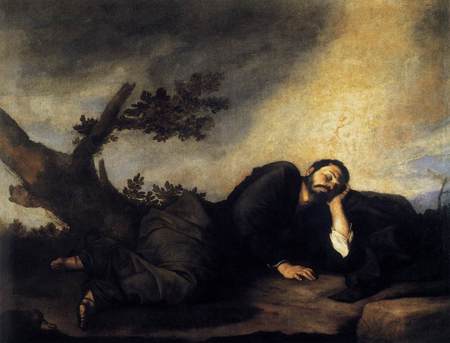Et ero custos tuus
Genesis 28:10-22

I Will Be Thy Keeper
For all who, like the patriarch Jacob, journey, and seek, and dream, there is a message of hope in today’s First Reading:
I will be thy keeper whithersoever thou goest,
and will bring thee back into this land:
neither will I leave thee,
till I shall have accomplished all that I have said (Gen 28:15).
Because He Hoped in Me
The Responsorial Psalm — the very one sung nightly at Compline in monasteries the world over — reiterates the promises of God:
Because he hoped in me I will deliver him:
I will protect him because he hath known my name.
He shall cry to me, and I will hear him:
I am with him in tribulation,
I will deliver him, and I will glorify him.
I will fill him with length of days; and I will shew him my salvation (Ps 90:14-16).
House of God and Gate of Heaven
Seized by a strange awareness of the presence God, Jacob wakes from sleep and says:
“Indeed the Lord is in this place, and I knew it not.”
And trembling he said: “How terrible is this place!
This is no other but the house of God, and the gate of heaven” (Gen 28:16-17).
The Church sings these very words in her liturgy of Dedication. As the entrance procession crosses the threshold of the temple and advances toward the altar, Jacob’s mystic utterance becomes the Church’s chant of eucharistic amazement:
Terribilis est locus iste:
hic domus Dei est,
et porta caeli:
et vocabitur aula Dei.
It is significant that in the liturgical and mystical traditions of the Church Jacob’s expressions of holy awe become titles of the Blessed Virgin Mary. Overshadowed by the Holy Spirit, Our Lady is the House of God and the Gate of Heaven. Her virginal womb became, by virtue of the Incarnation, a fearful and wondrous place.
Eucharistic and Marian Amazement
He whom the whole world cannot contain enclosed himself within Mary, just as today He encloses Himself within the fragile body of His Church. He who today hides Himself in the mystery of the Most Holy Eucharist, first hid Himself, for our sakes, in Mary’s womb. Eucharistic amazement is inseparable from a certain Marian amazement. Both find expression in the liturgy of the Church and in the poetry of her saints.
Abandonment
One’s awareness of the mystery of the Blessed Virgin Mary grows in proportion to one’s abandonment to the designs of God and to all the dispositions of His providence, however disconcerting these may appear to be at certain moments of life’s journey. The act of consecrating or entrusting oneself to Mary is the shortest and surest way of abandoning oneself to all that God permits and ordains.
